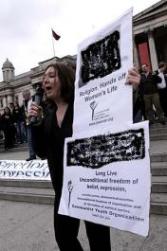 Maryam Namazie of the Worker Communist Party of Iran – who was the National Secular Society’s “secularist of the year” in 2005 – once again explains why, in the interests of “progress”, the right of Muslim women to dress as they choose must be suppressed:
Maryam Namazie of the Worker Communist Party of Iran – who was the National Secular Society’s “secularist of the year” in 2005 – once again explains why, in the interests of “progress”, the right of Muslim women to dress as they choose must be suppressed:
“There are innumerable women and girls in Asia, the Middle East and North Africa to right here in the heart of Europe who know from personal experience what it means to be female under Islam – hidden from view, bound, gagged, mutilated, murdered, without rights, and threatened and intimidated day in and day out for transgressing Islamic mores. The veil, more than anything else, symbolises this bleak reality….
“I know our opponents often argue that there are many more pressing matters with regards to women’s status. Why all the fuss they ask? To me, it is like asking what all the fuss was about racial apartheid – or segregation of the races – in apartheid South Africa.
“… some of these apologists will concede that compulsory veiling must be opposed … but if it is a choice freely made than one must defend the ‘right’ to veil. I wholeheartedly disagree…. There may be women who ‘freely choose’ to genitally mutilate their daughters or immolate themselves on their husband’s funeral pyre but that does not mean that we must then defend the right of women to do so or defend the practice of Suttee or FGM….
“The veil is not a piece of cloth or clothing, though it is often compared to miniskirts or other ‘lewd’ forms of clothing the rest of us unveiled women seem to wear. Just as the straight jacket or body bag are not pieces of clothing. Just as the chastity belt was not a piece of clothing. Just as the Star of David pinned on Jews during the holocaust was not just a bit of cloth….
“And this is why the chador, burqa and neqab must be banned – to defend women’s rights…. Because it is unacceptable for women to be segregated in the 21st century; and for women to walk around in a mobile prison or body bag because religion deems that they be kept invisible…. The hijab or any conspicuous religious symbol must be banned from the state and education and relegated to the private sphere. This helps to ensure that government offices and officials from judges, to clerks, to doctors and nurses are not promoting their religious beliefs and are instead doing their jobs….
“Throughout history, progress and change have come about not by appeasing, apologizing or excusing reaction, but by standing up to it firmly and unequivocally. This is what has to be against Islam, political Islam and the veil. We have to state loud and clear that sexual apartheid has no place in the 21st century; enough is enough.”
Scoop, 26 March 2007

 Maryam Namazie of the Worker Communist Party of Iran – who was the National Secular Society’s “
Maryam Namazie of the Worker Communist Party of Iran – who was the National Secular Society’s “ “Common sense seems to have prevailed in the High Court ruling giving schools the right to ban Muslim girls from wearing the full face niqab.
“Common sense seems to have prevailed in the High Court ruling giving schools the right to ban Muslim girls from wearing the full face niqab. “Several years ago I started work at a prestigious sixth form college on the outskirts of London…. I was utterly flummoxed when I entered the classroom on my first day to be confronted by three girls in the back row, sitting side by side wearing the niqab, the full-face veil which leaves only a tiny slit for the eyes. Recovering myself, introductions were made. The voices behind the veils told me their names but – because there were no faces to put them to – I promptly forgot them.
“Several years ago I started work at a prestigious sixth form college on the outskirts of London…. I was utterly flummoxed when I entered the classroom on my first day to be confronted by three girls in the back row, sitting side by side wearing the niqab, the full-face veil which leaves only a tiny slit for the eyes. Recovering myself, introductions were made. The voices behind the veils told me their names but – because there were no faces to put them to – I promptly forgot them.